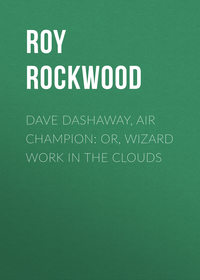
Dave Dashaway Around the World: or, A Young Yankee Aviator Among Many Nations
“I think time and patience will fix things up,” he announced.
“How much time?” inquired Hiram.
“I hope not a great lot of patience,” said Elmer, with a longing thought of the home mainland.
“There will be some brazing and hammering to do,” explained Dave. “We will have to build a fire. It will soon be dark and we must wait for daylight. Now then, fellows, don’t waste any nerve force worrying. What we lose to-day we’ll try to make up for when we get started again. We will find a good camping spot, have a pleasant evening, and a full night’s sleep. That will put us in fine trim for real business in the morning.”
“Begone dull care,” sang Hiram, in a jolly tone. “We’ll forget that we’re circling the globe for one ten hours, and be common, everyday boys out on a picnic lark, and report for duty in the morning.”
“There’s an inviting spot,” observed Dave, pointing to a copse on a little rise in the near distance.
Before dusk the airship boys had gotten the Comet safely placed, blankets out, a campfire built, and were settled down comfortably for the evening. There was nothing to indicate that the island was inhabited with wild beasts. It seemed to be a little emerald patch set down in the ocean, a sort of lost Crusoe reef, too small to have a name or a place on the marine charts.
One by one the boys drifted into slumberland. It must have been nearly midnight when Hiram and Elmer awakened to find Dave shaking them vigorously.
“Get up, fellows,” directed the young airman. “Something’s going on that we have got to investigate.”
CHAPTER XXIII
THE BLAZING BEACON
“What’s the trouble now, Dave?” speedily inquired Hiram, getting to his feet and Elmer after him.
“No trouble at all, I fancy,” was the reply; “quite the contrary, in fact. Look there.”
The young pilot of the Comet pointed across country towards the beach. Where a hill ran up to a sharp promontory jutting out over the ocean, a bright light showed.
“Why,” cried Hiram, “it’s a blazing heap of some kind. Looks as if it was up off the ground.”
“Yes, and it doesn’t burn like wood or oil. Notice the smoke and the way the flames leap up in the air? What do you suppose it is, Dave?” inquired Elmer.
“I can’t imagine, unless it is some beacon,” replied the young aviator.
“We can soon find out,” declared Elmer. “Wait a minute.”
The speaker ran to the biplane. He soon returned, his telescope in hand. This he leveled at the distant glow.
“You’re right, Dave,” he announced excitedly. “It’s a beacon, sure, and it’s pitch, sure. See for yourself.”
“Yes,” assented the young aviator, levelling the glass. “There is no doubt that it is a signal of some kind. I can make out the skeleton legs of some kind of a brazier.”
Hiram came in for a show at the spyglass. His decision enforced that of his friends.
“What will we do – investigate?” he asked of their leader.
“We must do that,” replied Dave. “It can’t be very far away.”
“What will we do with the machine?” questioned Hiram, who did not relish being left behind.
“We can roll it to the beach and keep it with us,” explained Dave. “Come on.”
“Maybe this is an inhabited island after all,” suggested Elmer. “I’d like to know. We don’t want to run into cannibals and have them roast us.”
The airship boys got ready to leave their temporary camp. They gained the beach, where progress was level and clear for the Comet. The blazing beacon was an excellent guide, and they neared it rapidly. When they came to the foot of the hill, they discovered a deep embrasure in its surface.
“Run the machine in there,” directed our hero. “Nobody is likely to disturb it before we return.”
It was with a good deal of curiosity and excitement that the boys ascended the hill. That gained, Dave took a broad survey of its top. No habitation or person was in view. At the edge of the highest point, commanding an open view of the ocean, was a large brazier, such as is used in light blacksmithing work. Its broad flanging top held a barrel, evidently containing pitch or some readily inflammable material. The fire sent up dense clouds of thick, black smoke. At the same time, however, the bright flames shone far out over the waters with a brilliant glow.
“Queer,” observed Hiram, staring at the brazier with no clue as to the hand that had lighted it.
“Yes, some one started that fire, and quite recently,” declared Dave.
“I wonder why? And who it could be?” chimed in Elmer.
“We had better set about finding out,” suggested Hiram.
The young airman took the lead in a search for the mysterious owner of the brazier. Finally, as they approached a slight dip in the surface of the ground, he swung his arm back to command a halt.
Where some trees showed, the reflection from the fire outlined a ragged tent made out of a sail. Near it were some boxes and barrels. There was a small table and a stool, a little oil stove, and some cooking utensils.
A hammock swung between two trees. Lying in this, apparently asleep, the curious explorers made out a human form. The young airman waved his comrades back and cautiously approached the unexpected layout before him.
A near glance showed our hero that the occupant of the hammock was a white man garbed in nautical costume. There seemed to be no other person in the vicinity. Dave reached out and gave the hammock a rough swing.
Its occupant must have been a light sleeper. With wonderful suddenness and a sharp yell he bounded from his bed. He was a thin, short man, not weighing more than ninety pounds – so undersized, in fact, as he stood gaping at Dave in open-mouthed wonder, that the latter felt inclined to laugh at the grotesque figure he made.
“Why – where – when!” gasped out the man, and, almost overcome, he could utter no further coherent words.
“Do I happen to come here – and my friends? That beacon directed us; who are you?” asked our hero.
“Shipwrecked mariner,” was the reply, in a mournful tone.
“You are a castaway, then?”
“That’s it – good ship Flying Scud, Nantucket. Been here two months. What’s your craft?”
“The airship Comet,” replied our hero.
“W-what?” and the man looked astounded and then grinned. He rubbed his eyes to convince himself that he was not dreaming. Then he gazed at Dave in a hurt way, as if he felt that our hero was making fun of him.
“That’s true,” the young airman hastened to say. “Myself and my friends arrived here by accident only a few hours since. The power on our machine gave out, and we landed in the fog, not knowing where and we don’t know now.”
By this time Hiram and Elmer had advanced to the spot. The man scanned them closely. He rubbed his head in a worried, uncertain sort of a way, as if figuring out something that puzzled him. Then he said, after a long pause:
“I was in hopes my beacon had called a ship. Seeing as it isn’t, I suppose there is no chance of my getting away from here?”
“Why not?” challenged Dave, encouragingly. “Did you ever ride in an airship, my friend?”
“No, never saw one. I’ve read about them and have seen pictures of them. To a regular tar, used to solid planks for nigh onto twenty years, those flimsy things don’t appeal, somehow.”
“That’s because you don’t know what real sailing is,” declared Hiram.
“Where is this new-fangled contrivance of yours?” inquired the man, looking into the sky and then all around the hill.
“Come with us and we’ll show it to you,” promised Dave.
“All right. Then I’ll show you my ship.”
“Oh, you have one?” inquired Elmer in surprise.
“What is left of the good old Flying Scud, yes,” answered the castaway, mournfully. “You see, friends, she must have struck a reef and sprung a leak. Anyhow, that dark, stormy night when I found myself drifting on her alone, I had to figure out that the captain had given her up as doomed. They had abandoned her in the long boat while I was asleep in the forecastle. Anyhow, when I came on deck, I found the ship deserted. Maybe the crew thought I had been swept overboard. Perhaps they couldn’t find me – you see, I’m so small,” concluded the speaker, plaintively.
“Say, mister, how did you get out of it?” asked the interested Hiram.
“The Flying Scud was rolling like a dancing sailor. I thought it was the last of Jabez Hull, yours truly. As she sided over, I strapped a life belt on me and dropped into the sea. Well, to make a long story short, I landed on this island. The next morning I found the old ship a wreck but her bow out of water, down on the beach yonder. She’s been there since. Can’t be budged, can’t be used, but I’ve been breaking her up to build some kind of a craft to get away in. Then, too, I’ve got food and furniture for my camp here. I ain’t much of a ship carpenter and got sort of discouraged, and for a week I’ve got busy and burned up a barrel of tar as a beacon.”
The boys pulled the Comet into view when they reached the spot where they had stowed it. The flare from the beacon enabled a full view of the biplane. It seemed as though Jabez Hull would never cease staring at it. He forgot all about his own forlorn situation in asking half a hundred wondering questions as to the machine and what it could do.
When he led the airship boys down the beach and showed them the wreck, it was their turn to become interested. What pleased the young aviators most of all was the discovery of a small portable forge. This the castaway had removed from the ship to assist in building his boat of escape. This, scarcely begun, was lying on the sand.
“Fellows,” said Dave, to his assistants, “this is a great stroke of luck for us. We can repair the machine in a good way, with a forge and tools to help us.”
“Yes, and there’s a whole tank of gasoline aboard the Flying Scud,” volunteered Hull.
The boys went back with the castaway to his camp. No one thought of sleeping amid the excitement of the occasion.
“We must get up early in the morning,” said Dave. “We must lose no time in starting on our way.”
“See here,” spoke up the castaway; “I suppose there’s no chance of my thinking of having a show to get away from here with you?”
“We shall certainly try to find a place for you,” replied Dave, promptly.
“You will?” cried Hull, joyously. “Oh, but that’s grand! See here, friend, you know what I’ll do if you fellows get me safely to the American coast?”
“What, now?” questioned Hiram, who liked to hear the odd old mariner talk.
“I’ll give you twenty thousand dollars.”
Our hero said nothing, but Elmer stared hard at the speaker and Hiram nudged him and winked.
“Provided,” continued Jabez Hull – “provided you take my treasure also along in your airship.”
“Your treasure, Mr. Hull?” repeated Dave. “What does it consist of?”
“A keg – yes, friend, probably the most valuable keg in the world. It weighs over fifty pounds, and it’s precious as diamonds. Land me anywhere near to a big city till I realize, and I’ll hand you over twenty thousand dollars in good, solid, hard cash.”
CHAPTER XXIV
THE HOME STRETCH
“Ready for a start,” ordered Dave.
It was under new and favorable circumstances that the young pilot of the Comet spoke the words. The lonely island in the South Atlantic was now a mere fading memory, the many leagues traversed by land and sea lost in the past. The Comet and the airship boys were stationed in a field near to a little hostelry on the outskirts of Rio Janeiro.
It was rare good fortune, indeed, that the young adventurers had happened across Jabez Hull. Within twenty-four hours after discovering the shipwrecked mariner the Comet was on her way due west, with a new passenger.
The forge, tools and metal material once belonging to the wrecked Flying Scud had come in most usefully. Dave knew enough of popular mechanics to utilize them practically. He declared the biplane as solid and perfect, after a careful overhauling and repairing, as when the machine had left the original starting place of the great international race around the world.
The “treasure” of the eccentric Jabez Hull had been taken aboard. It represented a keg sewn up in a coarse canvas jacket. Hiram was alive with curiosity to know what possible material the package could contain to equal in value the vaunted twenty thousand dollars. On that point, however, the castaway had insisted on preserving utter silence.
“I’m a man of my word,” he said, “and that is all there is about it. Land me anywhere on American territory and I will divide my riches.”
With this the airship boys were forced to be content. Room was made for the precious keg by leaving behind on the island the greater part of the exigency equipment of the Comet. The young pilot felt that now all they need fear was the giving out of the gasoline supply. There was plenty of this aboard the wrecked ship, and they managed to find storage for quite an extra supply of it.
It was a daring dash, this final one over leagues of open sea in their frail aircraft. Once begun, however, the airship boys were dauntless and tireless. Fine weather and favorable winds assisted them, and without a single notable mishap they had reached the great Brazilian metropolis.
The young aviator was anxious to get to a telegraph office at once. He left Hiram and Elmer in charge of the Comet. Jabez Hull insisted on accompanying him to the city.
“I want to get action on that keg of treasure,” he said. “I know several shipping houses in Rio. I’ll be back here to the airship by noon.”
“Make it noon, sharp,” advised Dave, “for we cannot afford to lose a single second in the race now.”
“I’ll be here on time, don’t you fret,” declared the castaway.
He and Dave parted when they reached the heart of the city. The young airman was back with his friends before noon. He had gotten in touch with Washington. What he learned made him more than anxious to resume the flight.
“We are third, fellows, so far as heard from, I am sorry to say,” he announced to his anxious comrades, and this put them in a great flutter.
“You don’t mean to say that any of the machines has reached goal?” cried Hiram, his heart sinking to his boots.
“No,” replied our hero; “but number seven was reported at Para yesterday. This morning number two was at Cayenne. They are hundreds of miles nearer home than we are.”
“Then it’s a run day and night from this on,” insisted Hiram, bustling about excitedly.
“It will have to be, if we expect to make good,” said Dave. “Mr. Hull has not returned yet?”
“Not a sign of him,” reported Elmer.
They were all busy for the next hour, getting things in shape for a speedy and sustained flight on the home stretch. Dave glanced at his watch.
“It is after noon,” he observed. “I don’t see how we can afford to wait any longer for Mr. Hull.”
“Why, we simply mustn’t,” declared the impatient Hiram.
“Get ready for a start, then. Here, Elmer,” and Dave wrote a few lines on a card. “Take that to the hotel keeper and tell him to give it to Mr. Hull when he shows up.”
“What were you writing?” inquired Hiram, as Elmer darted away on his mission.
“Directions as to how he can wire us and where he can find us later,” replied our hero.
They waited ten minutes after the return of Elmer, but there were no signs of the missing passenger of the Comet. The machine went aloft as if filled with the spirit that infused its crew. They were soon whizzing on their way north.
“Wonder what our queer shipwreck friend will say when he finds us gone?” inquired Hiram.
“He will understand the urgency of the situation, for I explained it in my note,” said Dave. “He has some money with him, I know, and will doubtless make for Washington at once.”
“I say,” broke in Elmer; “what do you fellows think about this boasted treasure of his?”
“I, for one, don’t think anything about it at all,” responded Hiram, bluntly. “He’s either a dreamer or a skeesicks. His not coming back to us looks as if he had served his purpose in getting to safe territory and has abandoned his old keg.”
“I’d like to know what it holds,” said Elmer.
“Well, it isn’t gold and it isn’t diamonds,” replied Hiram, rather contemptuously. “I noticed in shifting it this morning that its canvas jacket was greasy at one place, just as if the keg was full of oil.”
“Never mind,” spoke Dave. “It will do for ballast till we reach home. Then, if Mr. Hull does not appear, we will have to open the keg and see what is in it.”
The Comet made five hundred miles in three laps. Once only, at Caracas, did they have to stop for gasoline. It was early one morning when the Comet came to a stop near Belize.
Dave as usual hurried to the nearest telegraph office, and soon had the wires busy. His anxious assistants greeted his return all in a quiver over expected news.
“What have you found out, Dave?” projected Hiram.
“Yes, we’re all on edge to know if there is a chance to get in first,” added Elmer.
“Number seven is two hundred miles ahead of us – just sighted at Vera Cruz,” said the young airman. “No word has been received about number two since our last report.”
“Oh, Dave,” cried Hiram, in a wild fever of longing and suspense, “we’ve just got to reach goal first!”
“We shall make a very hard try, at all events,” replied our hero, doughtily. “Get out the chart, Elmer. We must save every needless crook and turn from this on.”
The eager boys were soon inspecting the chart. Vera Cruz was two hundred miles away. Number seven had over six hours’ lead, estimating the situation on a full speed basis. The young air pilot did some intense calculating. Then he drew his finger across the chart past New Orleans, across Louisiana, and on a line as the crow flies for Washington.
That day was one of the greatest stress for the airship boys. There was no thought of sleep, and they cared little for food. Hiram chattered the greater part of the time. Elmer was so anxious that he was restless and worried. Dave kept at the wheel, grim, determined and persevering.
They ran steadily all the next night. At a little town over the border of Georgia they had to stop for gasoline. The storekeeper from whom they obtained it gave them some information that spurred them up afresh.
“You’re the second in the last three hours,” he informed them.
“You mean the second airship?” inquired Hiram, eagerly.
“Just that. One flew over about daylight.”
“How headed? What did it look like? Where did it go?” In his hurry and eagerness Elmer stumbled over his words recklessly.
The man could not describe the airship, but enough was gathered from him in a general way to give the boys some idea of the course taken by their predecessor.
“It’s number seven, I have every reason to believe,” said Dave, when they started up again.
“Then it will be a close finish,” declared Hiram. “We’ve gained on her a good deal, you see.”
It was superb running for several hours after that. The landscape beneath them, now wild and desolate, seemed to spin along like a rapid panorama. They were traversing an uphill and down dale course, when Hiram suddenly uttered a positive yell.
“Dave, Elmer,” he shouted – “look there!”
“It’s number seven, sure as you live!” echoed Elmer, excitedly.
“I think so, too,” agreed their pilot more quietly, but all his senses were on the keenest alert.
Over beyond a high ridge all hands saw distinctly an airship. Its outline answered to the description of number seven. The way it sailed told that it was an expert racer and under the control of a true professional.
It was lost to view behind a tree-capped ridge. When the Comet in its course has got past this obstruction, the airship had disappeared.
“It’s gone, but where?” called out Hiram.
“There it is,” suddenly cried Elmer.
About three miles ahead of them was a little settlement. This side of it a fenced-in farm showed. In the center of its barnyard the airship boys saw the machine that had been sailing aloft a short time previous.
Apparently it had descended on account of some break or accident. There seemed to be no valid reason why it should land at a remote farmhouse.
“Why, there’s trouble,” exclaimed Hiram.
“There surely is,” said the young pilot of the Comet, and the trio viewed a somewhat startling spectacle.
The owner of the other airship stood near his biplane. Four men surrounded him. Three of them were armed with guns, and they confronted the airman in a menacing way.
CHAPTER XXV
CONCLUSION
The airship boys at once saw that their fellow aviator was in trouble. Our hero made a direct descent. The Comet came to a standstill beside the other machine. Its pilot leaped out and approached the group.
Dave at once recognized number seven, and the young man, Pierce, who ran it. He hailed him in a friendly fashion. Then he turned to the four farmers. A frowsy, obstinate-looking old fellow with a pitchfork was evidently the father of the three stalwart youths armed with shotguns. First he regarded the newcomers with surprise, and then suspiciously and with dislike.
“Why, what is the trouble here?” inquired the young airman.
“That’s the trouble,” growled the old man, pointing to a row of upset bee hives and a break in the field fence beyond. “Do you see that horse over there making for the woods? Well, that’s old Snorter, my primest animal. This here young fellow comes down in his b’loon and scares the hoss nigh into fits.”
“Ran out of gasoline and a bolt out of gear,” explained the pilot of number seven.
“You have no right dropping into my yard!” shouted the farmer, wrathfully. “It’s trespassing.”
“That’s right,” drawled the biggest of his sons. “I’m a deputy of the sheriff in this county. You have violated the law. I shall have to take you to Millville to court to answer in an action of wilful trespass.”
“Yes, and I shall insist that you be held in a civil suit for damages,” declared another of the sons.
Young Pierce cast a hopeless look at his machine and anxiously at Dave. The latter took in the situation at a glance.
“See here, mister,” he said to the old farmer; “we are desperately sorry that this has happened.”
“Yah!” sneered the shrewd old schemer – “money talks.”
“How much?” demanded our hero, without hesitation.
“Well, them bees is a special brood. The hives and the fence ain’t much, but there’s old Snorter. He may wander away and get lost; he may fall into some of those lime pits beyond the timber and get hurt. Then again, he’s so frightened he’ll probably run away at the least scare after this. One hundred dollars, I told this young man here.”
“But I haven’t got it,” cried Pierce. “I offered to give you an order on Washington, and you won’t take it.”
“Not I,” retorted the hard-fisted old fellow. “Cash down on the nail head.”
“I ran short at Savannah,” explained Pierce to Dave. “I fancied I could get through with the twenty dollars I had left, being so near home.”
Dave took out his pocket book. The old farmer’s eyes glistened as our hero handed him five crisp twenty-dollar banknotes.
“Now then, Pierce,” spoke the young airman, “that’s settled. What’s the trouble with your machine?”
It did not take the expert Dave long to find out. Within half an hour he had the faulty gear sound as ever. The Comet had a full supply of gasoline. A transfer of some of it was made to the tanks aboard number seven.
The farmer and his sons, fully satisfied now, stood watching operations. Hiram and Elmer hustled about, giving their leader and his fellow aviator all the help they could.
“Everything is in trim,” announced our hero, finally. “Good-bye and good luck.”
Pierce held the hand so generously extended by Dave in a tremulous grasp. Tears of gratitude and esteem had rushed to his eyes.
“Dashaway,” he said, in a choked, broken voice; “you’re a man, every inch of you!”
Number seven went aloft. Dave called “all aboard!” Hiram pulled his face at the mean-spirited old trickster who had bled them. Elmer shook his fist at the farmer crowd.
“That’s you!” exclaimed Hiram. “Just fitted Pierce out to beat us, and delayed us, besides.”
“Wasn’t it the best kind of fair play?” challenged Dave.







